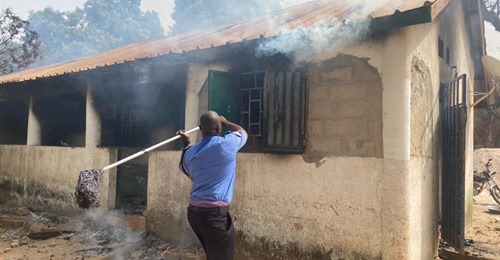By Kebba Ansu Manneh
Representatives of artisanal fishermen have called on the Gambia government to immediately ban the operations of semi-industrial fishing vessels in the country’s territorial waters.
According to them, the operations of these vessels are only anchored on administrative directives, but not based on the laws of The Gambia, including the Fisheries Act.
They made this call on Thursday 25th August 2022, at Jeswang where they held a day-long sensitization meeting organized in collaboration with the West African Association for the Development Artisanal Fisheries, (WADAF).
The event centered on advocacy and awareness-raising on the need for transparency in the fisheries sector, and for the sustainable management of critical stocks and coastal sites for small pelagic resources.
According to participants, the unregulated operations of the semi-industrial fishing vessels in Gambian waters have hindered progress in the artisanal fishing sub-sector. He noted that the unregulated activities of these vessels are mainly conducted in areas designated for the artisanal fisherfolk, adversely affecting the livelihoods of the artisanal fishermen.
“We (fisheries stakeholders) have had a retreat at Sindola in the past and from there we came to Atlantic Hotel where we did the validation. At that validation, the representatives of the artisanal fisheries have raised the issue of the semi-industrial vessels, and we called for their banning,” said Fatou Pierre Choye, deputy coordinator of the Small Pelagic Coalition.
She added: “Right now, if you go to the ports most of the catches being offloaded are brought in by semi-industrial vessels; they are catching the same species as the artisanal fishermen.”
According to her, the operations of Semi-Industrial Vessels within the zones designated for the artisanal fishermen usually resulted in complaints of intrusion into their fishing territory, destruction of nets, and low catches, adding that the Coalition of Small Pelagic Association will do everything possible to protect Pelagic fish resources through advocacy and sensitisation. This is with the hope that a ban will be placed to stop the use of misfit fishing nets and a total ban on Semi-Industrial vessels that continue to harm the sector.
Dilating on the activities of the Coalition of Small Pelagic Association, Mustapha Yarboe disclosed that the association is embarking on a series of sensitisation and information sharing with various stakeholders. This is with the view of protecting the scarce resources of pelagic fish resources. Adding that, many stakeholders within the coastal belt have already benefited from a series of training support by WADAF.
He observed that the protection of pelagic fish species cannot only be left in the government’s hands and thus needs the participation of all and sundry. He noted that the lack of implementation of fisheries regulations and laws is hugely responsible for the country’s depletion of Pelagic fish species.
“We will continue with our advocacy and sensitisation activities along the coastal and rural fish landing sites as part of efforts to protect the pelagic fish species.
These are fish resources that are affordable to the ordinary people and once we allow them to be depleted many Gambia families will suffer,” Mustapha Yarboe, Coordinator Coalition of Pelagic Fish Association explained.
In addition, he said they will also engage the government with the view to strengthen and implement the regulations and laws governing the sector.





